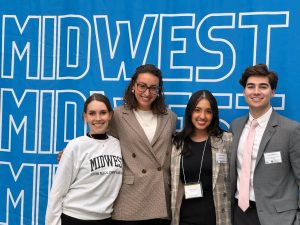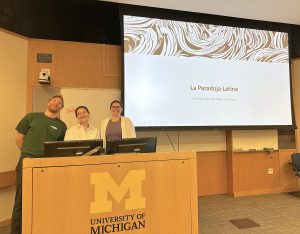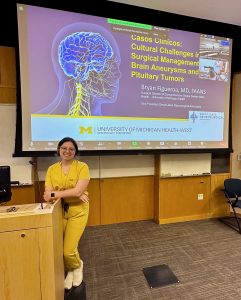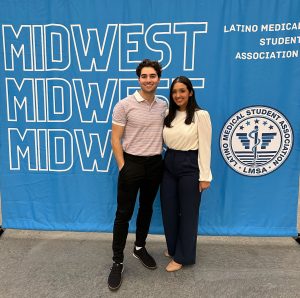
LMSA Midwest Conference
Growing up in a culturally diverse household, I’ve become intimately familiar with the joys of celebrating various holidays, savoring a wide range of cuisines, and traveling to my parents’ birth countries, which span opposite sides of the globe. I celebrate my diversity as it inspires me to foster linguistic and cultural competence in my future career as a physician. In college, I chose to study Spanish language and culture through my coursework, knowing this perspective would enable me to enrich my soon-to-come medical knowledge.
At the University of Michigan Medical School, I began my first year eager to engage with the Latinx medical community. I learned about the Medical Spanish program at Second Look (SL@M) and knew it would offer me the opportunity to integrate my background to better care for patients. The program, affiliated with the Latin American Native American Medical Association (LANAMA), has helped me find a community that spans all years at UMMS.

M1s, John Morse, Michella Parlett, and Ellie Wright (left to right) presenting their cultural presentation on La Paradoja Latina as part of the intermediate elective.
The Heart of Medical Spanish at UMMS
As the M1 Medical Spanish coordinator, the Intermediate Elective is the most common way students engage with the Medical Spanish program. Guided by Oliver Gatonez from Michigan Medicine Interpreter Services, this elective melds lectures with case-based discussions, history taking, and physical exam maneuvers, all in Spanish. Moreover, programming like cultural presentations and Spanish Standardized Patient experiences profoundly enriches our learning.
Casos Clínicos is another cornerstone of the program. These sessions facilitate discussions of clinical vignettes in Spanish, exploring cultural nuances crucial for treating Latinx patients. Led by Spanish-speaking faculty and residents, they allow for a deeper connection within the overarching Latinx community at Michigan Medicine. Most recently, we had the pleasure of hosting Bryan Figueroa, MD, a UMMS alum, who guided us through various neurosurgical medical cases, focusing on the treatment nuances for Latinx patients undergoing neurosurgery. All the while, we enjoyed homemade empanadas made by our very own Casos Clínicos coordinator, Stephanie Figueroa.
Our newest initiative, Horas Sociales, aims to bolster Spanish language proficiency and foster a sense of community among students at all language levels. Hosted in various informal settings, these gatherings encourage casual conversation and cultural exchange. Since founding Horas Sociales, we’ve nurtured a vibrant community of learners, eager to share and grow together.
I believe Medical Spanish is not only for those with a comprehensive background in the language but also enables everyone to gain cultural insights into a vast yet diverse population. My Cuban heritage from my father’s side is a fundamental aspect of my identity. My Spanish speaking might not be that of a native speaker, but over the years, it has transformed into a tool for connection that I use daily. It’s something I anticipate will only deepen as I start contributing to patient care in my upcoming clinical year.

LANAMA VP Alondra Alvarez and I at the LMSA Midwest Conference
Beyond UMMS: Connecting with the Latino Medical Community
My journey continued as I attended the LMSA Midwest Medical Conference with a group of my closest friends in February 2024. There was nothing better than stopping at one of the many coffee shops in Ann Arbor before we started our road trip to Case Western. This gathering was a vibrant celebration of Latinx culture in medicine, showcasing ongoing research and bringing together medical students, residents, and faculty from across the region. It was here, among peers from various backgrounds, that I grasped the broader impact of our work. The stories shared, the challenges discussed, and the research presented excited me for the everyday efforts to encourage and support Latinx communities both within and outside the medical field.
Natalie Vela, a graduating M4, led an incredible workshop on sustaining and starting Medical Spanish programs at medical schools in our region on behalf of the National Association of Medical Spanish (NAMS). She highlighted our program’s essential mission and the occasional challenges of such programming, including finding qualified long-term instructors and accreditation for the time students devote to this focus of their medical education. I hope to follow in her footsteps, as the outreach of this programming can expand across institutions and benefit a larger group of medical professionals and their patients.
A Call to Future UMMS Students
My journey through the Medical Spanish program at UMMS has been transformative, affirming my belief in the power of language concordance in healthcare. This program stands as a testament to Michigan and its students’ commitment to diversity, equity, and inclusion, offering a unique blend of clinical education and cultural immersion.
As I continue my medical school journey, I carry with me the lessons learned and the connections made, knowing they will shape my future in medicine. It’s a place where you can grow not just as a physician but as a compassionate and culturally aware human being. My commitment to my values has taught me that differences are made one patient, one conversation at a time.
Don’t miss the next Dose of Reality.
Andrew Martinez is a first-year medical student and the M1 Medical Spanish Coordinator with the Latin American Native American Medical Association (LANAMA). He is originally from Olney, Maryland and studied Spanish and Biology at Cornell University. He enjoys exercising whether that be playing volleyball, swimming, or weight training. Outside of school, he explores creativity in interior design, makes frequent trips to visit his partner in Boston, and tutors college students—in a noble effort to dodge the stereotype of the perpetually broke medical student.
